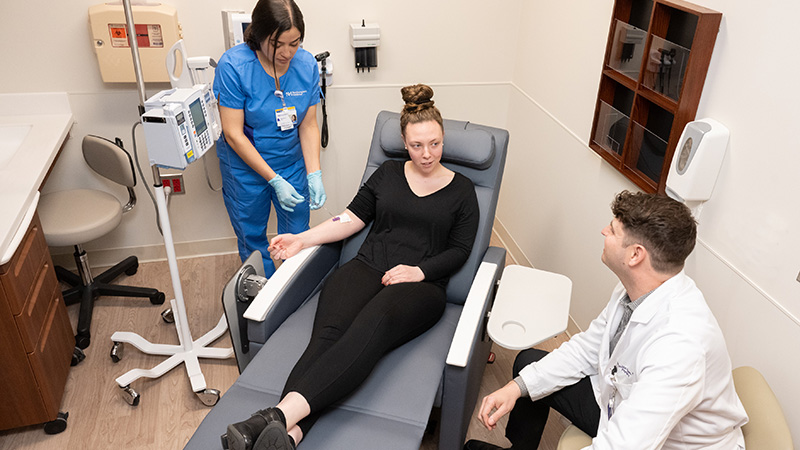How to Deal With Anxiety After Cancer Treatment
An Oncology Counselor Offers Guidance
Updated July 2023
Life doesn’t return to normal overnight after your oncology care team declares you “cancer-free.” Remission comes with its own challenges, including figuring out how to manage your health and dealing with the fear that your cancer could come back.
Anxiety is a slippery slope.— Missy Petty, MEd, LCPC
“The job of the patient who is in active cancer treatment is often easier to understand than the job of the patient in active cancer recovery,” says Missy Petty, MEd, LCPC, lead oncology counselor at Northwestern Medicine Living Well Cancer Resources. Petty facilitates a survivorship lecture series at Living Well. “After cancer treatment ends, it’s normal to feel lost, confused and afraid of recurrence.”
Petty offers guidance for navigating emotional unease during remission.
“For patients who have completed treatment, knowing what is your job and what is not your job can help you avoid unnecessary stress,” says Petty. “Paying attention to what is your job and what is your care team’s job can help you focus your emotional energy.”
Your Care Team’s Job After Cancer Remission
- Designing your follow-up care plan
- Diagnosing and treating any symptoms that may arise
- Determining the outcome of your disease
Your Job After Cancer Remission
- Paying attention to changes in your body and reporting them to your care team
- Actively participating in your care
- Listening to your care team
- Advocating for yourself
- Taking good care of yourself by:
- Making time for yourself
- Spending time with people who make you happy
- Seeing a counselor or attending a support group
- Maintaining a healthy weight
- Not smoking
- Exercising regularly
- Eating a healthy diet
- Reducing stress whenever possible
- Limiting alcohol
- Keeping up with regular health screenings and vaccinations
Managing Your Anxiety
“Anxiety is a slippery slope,” says Petty. “Anxiety tempts us to problem-solve. What begins as an effort to find a solution to the initial problem or concern can quickly escalate to identifying dozens of other problems until you are overwhelmed.”
When you’re feeling overwhelmed:
- Write it out. Write down your worrisome thoughts and list the evidence for and against them happening. When you’re done, throw the negative thoughts away.
- Shift your thoughts. You can’t think about two things at once. Try to replace your anxious thoughts with an emotionally neutral and time-consuming task — like counting ceiling tiles, naming the songs on your favorite albums, or visualizing all the houses on your street.
- Be mindful. Pay attention to your feelings instead of distracting yourself from them.
Know Your Triggers and Be Proactive
The anniversary of your diagnosis or even news of a friend or celebrity being diagnosed with cancer can stir up difficult feelings. The anxiety surrounding follow-up appointments and scans can also be overwhelming.
The best way to manage these stressors is by being proactive. Take advantage of the fact that you know these appointments and anniversaries are coming up. Prepare for them by planning activities that help ground and calm you, like going on a walk or being with friends who uplift you.
“When it comes to fear of cancer recurrence, you don’t have to know exactly what you would do,” says Petty. “You only need to know that if something were to happen, you believe you have what you need to manage it.”
Remember, emotional and mental health help is available for cancer survivors. Connect to resources for cancer survivors at Living Well Cancer Resources.





